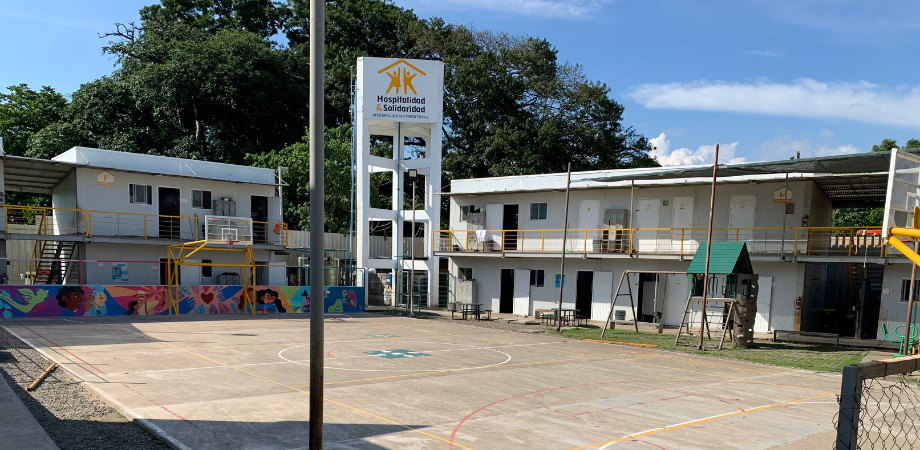
In the heart of Tapachula, the day heats up early. The Parque Central Miguel Hidalgo and Parque Bicentenario slowly fill with migrants, some in snaking lines to get a quick bite of food, others in families huddled in the shade. The center of town buzzes with people coming in and out of budget hotels, department stores, and uniformed students in white polo shirts heading to school.
“Migrants work a ton,” a Mexican advocate tells me, her painted nails tapping rhythmically on the table. “But employers don’t pay anything. The reason the employers give is that ‘Oh, you don’t have papers. Get permanent residence and we’ll see.’” She gestures outside the window. “In Tapachula there’s no real accountability. Suddenly you find yourself doing a job that’s not what you agreed to. Maybe for less money, maybe in private [where you are more vulnerable], maybe some other job completely.”
The vulnerabilities disproportionately fall on migrant women, particularly mothers. Migrant women are more likely to work in minimum and subminimum wage jobs. They face some of the harshest and most unstable living conditions. They experience unique and additional barriers to accessing healthcare and other basic services. And when they face harms, they are less likely to ask for help, less likely to be believed by authorities, and less likely to receive the aid they need to heal.
In the current story of migration in Mexico, migrants continue to arrive in families. In the past, family structure was varied: sometimes mothers with children, sometimes fathers with children, sometimes two-parent families. Now there are almost no fathers with children who reach local shelters like Hospitalidad y Solidaridad in Tapachula. A volunteer I spoke with told me that she couldn’t remember the last time she saw one—it had been months. As the family structure changes, the burdens on mothers are increasing.
Yet few institutions or interventions are designed with the needs of migrant mothers in mind. Often the sole providers and caregivers for their children, mothers are among the most vulnerable to exploitation and extortion because they must take the most dangerous or poorly paying jobs to provide for their families. The structural barriers and systemic inequalities faced by migrant mothers make it substantially harder for them to meet their own basic needs. And the available services are failing to adequately meet migrant mothers where they are.
Daily Struggles – Gendered Burdens
Tapachula is the first major city that many migrants encounter in Southern Mexico. Most migrants cross the Suchiate River 40 kilometers away at the Guatemala border and make their way to Tapachula. The entire journey is perilous, but this stretch may be the most dangerous of all. Sexual violence in the area is common. Migrants are especially vulnerable to violence and extortion at the hands of gangs and cartels. One shelter worker estimated that 80 percent of migrants between the Guatemalan border and Tapachula are kidnapped, and forced to pay a ransom for safe passage. Every shelter worker I spoke with reported seeing the handstamps and wristbands that the Cartel de Ancla uses to indicate who has paid a ransom or extortion fee.
Mexican refugee law requires that people seeking asylum remain in the state where they first apply for asylum for the duration of their proceedings. As a result, thousands of migrants in Chiapas and other regions of Southern Mexico are trapped in a bureaucratic quagmire. Claims take months to process. At the Hospitalidad y Solidaridad shelter, life has shifted dramatically. Three years ago, migrants used to stay only a night or two. Now migrants stay for months as they wait for a next step to become clear. There is a soccer team that plays against other local soccer groups. A teacher gives lessons in a school room upstairs for children, so that they continue to learn even with the disruption of movement.
Mothers providing for their children live closest to the edge, an accident or illness kicking the family into a cycle of perilous uncertainty. A migrant mother who lives in a budget hotel, for instance, may lack the money for rent if one of her children gets sick and she has to pay for treatment. To keep her family fed and sheltered, she may be forced to take whatever work is available, no matter how dangerous, poorly paid, or dubious the opportunity is. Migrant mothers can also face steep challenges meeting their own urgent healthcare needs. The prevalence of sexual assault on the journey means that access to reproductive healthcare is essential for arriving women and girls. But few services are available in Tapachula, and those that are available are unaffordable.
Migrant women require structural and systemic change to meet their basic needs. The migrant women I spoke with emphasized structural barriers and resource gaps, not direct gender discrimination, as their primary obstacles. One Haitian mother even told me that she felt like the clinic in Tapachula was one of only a few places in town where she received equal treatment as everyone else. But the relatively low importance of direct discrimination reveals a deeper and more pernicious problem—that women remain critically underserved by local institutions, the Mexican government, and international organizations.
A tailored approach that addresses the specific challenges faced by migrant women, and especially migrant mothers, is essential. Addressing the needs of migrant women is also critical to recognizing migrant women’s dignity, perseverance, and self-reliance by allowing them the opportunity to safely meet their basic needs. Women’s migration journeys are not just a fight for survival; their migrations pay testament to the strength of women navigating adversity in search of a better life for themselves and their families.

